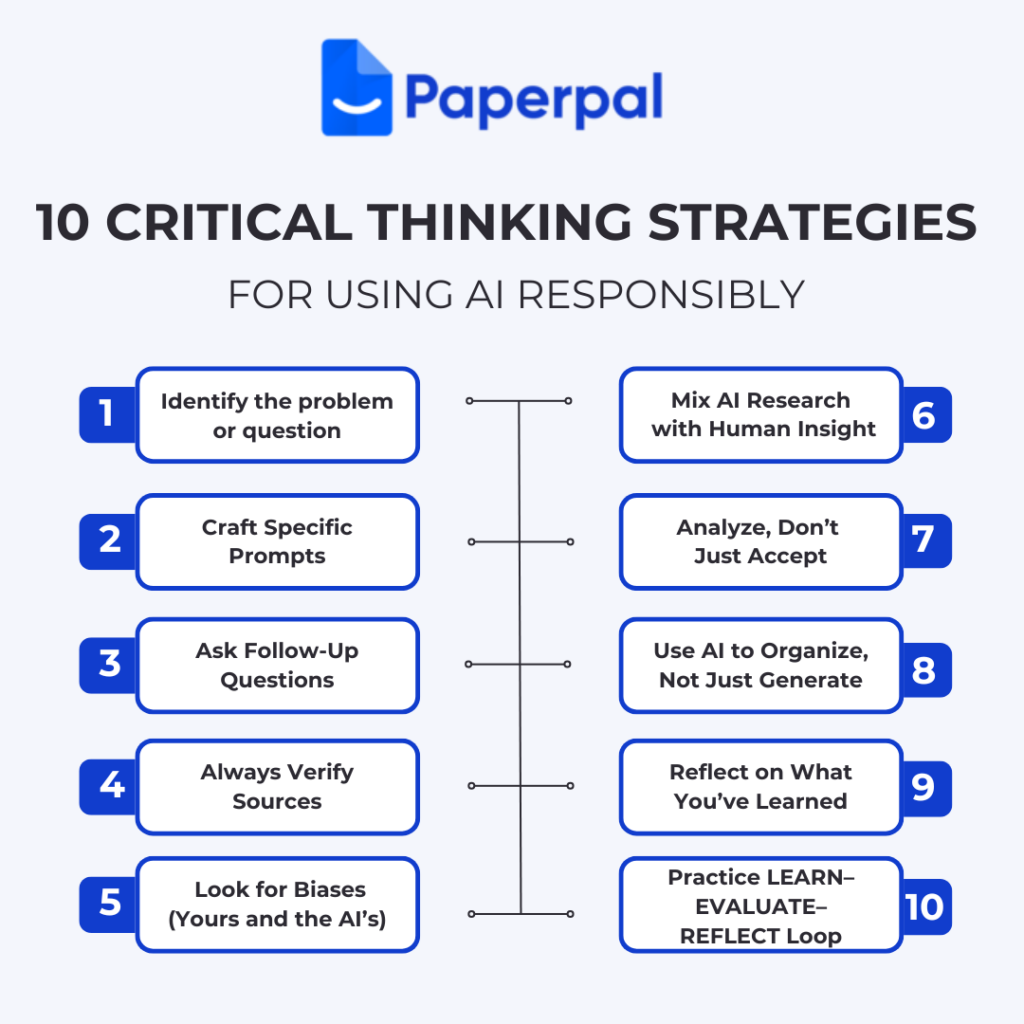The rise of AI has proven to be a watershed moment in history, with countless arguments for and against its use in practically every industry and use case conceivable. With AI now seeing widespread use in education and research, honing your critical thinking skills have never been more important. Real people with sharpened critical thinking skills aren’t just equipped to solve problems AI can’t — they are also better positioned to successfully leverage AI to improve their own capabilities.
There’s a fundamental difference between machine learning and human thinking. AI can generate patterns, mimic tone, and even surprise us with fresh insights based on its training data, but it can’t truly reflect, critically evaluate, or make decisions with expert intent. That responsibility still belongs to us, the human experts. In this article, we lay out 10 simple, powerful ways to polish your critical thinking and reasoning skills with AI by your side.

1. Identify the problem or question: Before using an AI tool, take a moment to identify what you’re trying to achieve. Are you trying to brainstorm ideas? Expand on your rough draft? Polish a research paper? Ask yourself: What am I trying to learn or uncover? Where do I need support? Am I using AI to explore possibilities or to narrow them down? Having a clear goal will help you steer the AI in a direction that enhances your thinking process.
2. Craft Specific Prompts: Critical thinking starts with asking the right questions. Nurture your curiosity, maintain a neutral perspective and draft your questions clearly. Vague prompts invite generic answers, while focused questions lead to sharper, more relevant responses. Instead of asking “Tell me about remote work in tech,” try “How has remote work affected employee productivity in the tech industry post-2020?” A more specific prompt pushes the AI to align with your thinking process.
3. Ask Follow-Up Questions: Don’t accept the first answer, keep digging deeper. AI can give you a starting point, but it’s up to you to question, clarify, reflect, and explore further. After getting an initial response, ask follow-ups like: Is this view widely accepted? Can you give an example? Are there any counterarguments for this? This helps you filter irrelevant information and assess reliability, while forming an opinion.
4. Always Verify Sources: Once you’ve gathered all of the information, sift through the noise and identify what information is relevant and what information isn’t. AI like ChatGPT are known to fabricate data, so it’s critical to check sources provided. When fact-checking and determining relevance, ask yourself: Does this source really exist? How credible is this information? Is this information outdated? Is it specialized for a specific field or relevant to my research?
5. Look for Biases (Yours and the AI’s): Critical thinking means recognizing your assumptions and questioning them. We all have biases, and so does AI – based on patterns from the data it’s trained on. Before you accept an idea or move forward, pause and ask: What am I assuming? What might be missing? Noticing bias helps you stay aware and open to other perspectives.

6. Mix AI Research with Human Insight: Use AI to explore or expand your thinking but don’t use the output as it; it’s critical to amplify and enhance AI responses with your own insights. While AI is the starting point, remember you are the expert. That’s how you keep your work original, thoughtful, and grounded in real understanding.
7. Analyze, Don’t Just Accept: Not all information is useful; AI included. Just because something sounds smart doesn’t mean it’s relevant or true. Pause to ask: Is this reliable? Is it significant to my topic or idea? What angle am I missing? Move past the noise, spot what matters, and build your conclusions on what truly holds weight.
8. Use AI to Organize, Not Just Generate: AI can be great at helping you think. Use it to outline, cluster ideas, or summarize—but don’t let it take over the writing. Shape the narrative yourself. Let AI assist with the heavy lifting, but when it comes to putting your thoughts into words, use your expertise to build your draft by deciding on what goes where and how.
9. Reflect on What You’ve Learned: Don’t stop at the answer, pause and think about the process. Did AI help you reach a solid conclusion? What worked, and what didn’t? Do I need to learn more about this? Reflection sharpens your critical thinking and reasoning skills. It turns quick outputs into lasting insights, helping you improve your results, and making your thinking process more efficient next time.
10. Practice the LEARN–EVALUATE–REFLECT Loop: Critical thinking isn’t a one-time task—it’s a habit. Every time you use AI, take yourself through a simple loop: Learn actively, Evaluate critically, and Reflect intentionally. This cycle keeps your mind engaged, your insights fresh, and your decisions sharper—making a smarter AI user, and a better thinker overall.
AI is a powerful tool but it’s only as useful as the mind guiding it. True value of AI comes when we pair its speed with our own depth of thinking. Critical thinking isn’t optional in the age of AI, it’s the very skill that makes AI effective, safe, and meaningful to use.
By setting clear goals and asking better questions, we stay in the driver’s seat. The strategies in this article are habits for thinking better, learning deeper, and creating with purpose. Use AI to assist—but never forget; the thinking is yours to do.
Ready to put these strategies into practice? Head to Paperpal and try out its range of academic-focused features to streamline your next research or writing task. Sign up now for Free!
Paperpal is a comprehensive AI writing toolkit that helps students and researchers achieve 2x the writing in half the time. It leverages 23+ years of STM experience and insights from millions of research articles to provide in-depth academic writing, language editing, and submission readiness support to help you write better, faster.
Get accurate academic translations, rewriting support, grammar checks, vocabulary suggestions, and generative AI assistance that delivers human precision at machine speed. Try for free or upgrade to Paperpal Prime starting at US$25 a month to access premium features, including consistency, plagiarism, and 30+ submission readiness checks to help you succeed.
Experience the future of academic writing – Sign up to Paperpal and start writing for free!



